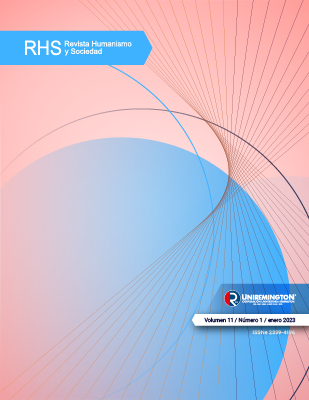Astronomy as an Interdisciplinary Strategy to Strengthen Academic Management at the San Antonio de Prado Educational Institution
Main Article Content
Abstract
Through the application of astronomy didactic units, a project was designed that aimed to strengthen academic management from an interdisciplinary curriculum perspective and implementing Virtual Learning Environments (VLE) in the San Antonio de Prado Educational Institution. The foregoing was based on an analysis of the study plan and surveys applied to teachers and students, which evidenced that there was no interdisciplinarity or projects that linked different areas of knowledge. Subsequently, teachers from different areas were invited to participate in the construction of astronomy didactic units based on inquiry and the STEAM approach. Once the previous phase was completed, the design of the proposal was evaluated and improved through the application of Google Forms to the entire educational community that participated in the project, from the study of the records obtained from the participant observation and from the surveys analyzed using the Atlas.Ti 8.0 program, which contributed to improving academic management. Finally, advances in the interdisciplinary processes were evidenced, and it was shown that astronomy and the STEAM model made it possible to achieve the competencies proposed in the Institutional Educational Project.
Downloads
Article Details

This work is licensed under a Creative Commons Attribution-NonCommercial-ShareAlike 4.0 International License.
Those authors who publish with this journal agree to the following terms:
The designated authors will retain copyright of all papers and grant the journal the right of first publication of their work, which will be simultaneously published under the Creative Commons Attribution License that allows third parties to share the work, as long as its author is attributed and this journal is identified as the original publisher.
Authors may enter into separate, additional non-exclusive licensing agreements for the distribution of the published work (e.g., post it to an institutional telematic archive or publish it in a monographic volume) as long as this journal is acknowledged as the original publisher.
References
Álvarez, O. (2004). Una llave maestra. Las TIC en el aula. Altablero, (29). https://www.mineducacion.gov.co/1621/article-87408.html
Asinc Benites, E., & Alvarado Barzallo, S. (2019). STEAM como enfoque interdisciplinario e inclusivo para desarrollar las potencialidades y competencias actuales. Identidad Bolivariana, (Edición Especial), 1-12. https://doi.org/10.37611/IB0ol01-12 DOI: https://doi.org/10.37611/IB0ol01-12
Cano, L & Ángel, I (2020). Medellín Territorio STEM+H Un diagnóstico de la Secretaría de Educación de Medellín sobre el desarrollo del enfoque en las instituciones educativas de la ciudad. UPB y Alcaldía de Medellín. Editorial UPB. http://doi.org/10.18566/978-958-764-837-9 DOI: https://doi.org/10.18566/978-958-764-837-9
Casassus, J. (2000). Problemas de la gestión educativa en América Latina: la tensión entre los paradigmas de tipo A y el tipo B. Unesco. https://eduvirtual.cuc.edu.co/moodle/pluginfile.php/546118/mod_resource/content/1/GE.JUAN.pdf
Castellanos, M. (2017). Estrategia de gestión académica para favorecer prácticas pedagógicas encaminadas al desarrollo del pensamiento científico. [Tesis de maestría, Universidad Libre]. https://hdl.handle.net/10901/10269
Chona Duarte, G. (1998). Problemática educativa en Colombia. El papel del profesor, lo que nos compete. Revista Tecné Episteme y Didaxis, (4), 2-3. https://doi.org/10.17227/ted.num4-5690 DOI: https://doi.org/10.17227/ted.num4-5690
Fourez, G. (1994). La construcción del conocimiento científico. Narcea.
Lederman N.G., Lederman J.S., Antink A. (2013) Nature of science and scientific inquiry as contexts for learning of science and achievement of scientific literacy. International Journal of Education in Mathematics, Science and Technology, 1(3), 138-147. https://files.eric.ed.gov/fulltext/ED543992.pdf
Lenoir, Y. (2013). Interdisciplinariedad en educación: una síntesis de sus especificidades y actualización. Interdisciplina, 1(1), 51-86. https://doi.org/10.22201/ceiich.24485705e.2013.1.46514 DOI: https://doi.org/10.22201/ceiich.24485705e.2013.1.46514
León León, G. (2010). La formación interdisciplinaria de los profesores: una necesidad del proceso de enseñanza y aprendizaje de las ciencias. Revista Ensayos Pedagógicos, 5(1), 119 - 130. https://doi.org/10.15359/rep.5-1.5 DOI: https://doi.org/10.15359/rep.5-1.5
Mikropoulos, T. A., & Natsis, A. (2011). Educational virtual environments: A ten-year review of empirical research (1999-2009). Computers & Education, 56(3), 769-780. https://doi.org/10.1016/j.compedu.2010.10.020 DOI: https://doi.org/10.1016/j.compedu.2010.10.020
Ministerio de Educación Nacional [MEN]. (2008). Guía para el mejoramiento institucional. De la autoevaluación al plan de mejoramiento. Serie Guías nro. 34. https://www.mineducacion.gov.co/1621/articles-177745_archivo_pdf.pdf
Ministerio de Educación Nacional [MEN]. (2005) Fundamentos conceptuales. https://www.mineducacion.gov.co/1621/w3-printer-299611.html
Ministerio de Educación Nacional [MEN]. (2017). Plan nacional decenal de educación 2016-2026. El camino hacia la calidad y la equidad. https://www.mineducacion.gov.co/1759/articles-392871_recurso_1.pdf
Morin, E. (1997). Sobre la interdisciplinariedad. Universidad ICESI. http://repository.icesi.edu.co/biblioteca_digital/handle/10906/2562
Morin, E. (2019). Sobre la interdisciplinariedad: Comunidad de Pensamiento Complejo. http://www.pensamientocomplejo.org/docs/files/morin_sobre_la_interdisciplinaridad.pdf
Plan Nacional de Desarrollo [PND]. (2018-2022). Pacto por Colombia, pacto por la equidad. Presidencia de la República, Bogotá, Colombia.
Pérez Matos, N. E., & Setién Quesada, E. (2008). La interdisciplinariedad y la transdisciplinariedad en las ciencias: una mirada a la teoría bibliológico-informativa. ACIMED, 18(4) http://scielo.sld.cu/scielo.php?script=sci_arttext&pid=S1024-94352008001000003&lng=es&tlng=es.
Sánchez Ludeña, E. (2019). La educación STEAM y la cultura “maker”. Innovación Educativa, (379), 45-51. https://doi.org/10.14422/pym.i379.y2019.008 DOI: https://doi.org/10.14422/pym.i379.y2019.008
UNESCO. (2011). Manual de gestión para directores de Instituciones Educativas. Ministerio de Educación Nacional de Perú. https://unesdoc.unesco.org/ark:/48223/pf0000219162
Unigarro, M. (2004). Educación virtual, encuentro formativo en el ciberespacio. Editorial UNAB.
Zanatta Colín, E. (20-24 de noviembre de 2017). Tendencias curriculares en los modelos educativos de las universidades públicas estatales. En XIV Congreso Nacional de Investigación Educativa del COMIE. San Luis Potosí, México.
